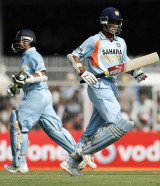
|

To blame Tendulkar or Ganguly for India's loss, however, would be churlish, given India desperately needed a solid start, and they had provided this
© AFP
|
|
Hindsight is always perfect vision, and the errors made by a losing team seem glaringly obvious, but when India fluffed their lines in the final stages of the sixth ODI in Nagpur, it was hard to even put the loss down to one particular aspect of the game. There was the costly dropped chance against Andrew Symonds. There are some unanswered questions about the batting order. There is the issue of India's fast bowlers struggling to provide early breakthroughs ... Where exactly does one start?
Well, a good place to begin is the toss, which in this case India lost, and immediately put themselves in a position of disadvantage. When Australia chose to bat - and this is a staggering statistic - they would have known just how poor India's record is when it comes to chasing against the world champions. The last time India successfully chased a target against Australia was way back in 1998,
in Sharjah, in what came to be known as Sachin Tendulkar's 'Desert Storm' series. Since then, India have attempted the task, either willingly or otherwise, 18 times, and failed on 15 occasions, with three matches, including the first game of this series in Bangalore, having no result.
The difference between the two teams, in the end, was only 18 runs, but in one-day cricket that's a lot. And India just made some basic mistakes that they were forced to pay for by a ruthless opponent. To start with, India should not have conceded 317, and in a big game like this, gaining the momentum as early as possible is crucial. Sreesanth, who replaced RP Singh for this game, did the exact opposite, spraying the ball around liberally in his first three overs, which cost 26 runs.
Two other patches cost India dear. The first came when Mahendra Singh Dhoni chose to use Yuvraj Singh in the 21st over - which went for 15 - in the middle of a period when Murali Kartik and Harbhajan Singh were doing their best to tighten the screws. And the third passage of play in India's bowling that would prove damaging, was the end overs. After the ball was changed things got easier for a well-set Symonds and 102 runs came from the last 10 overs, with 57 coming off the last five.
If Desert Storm was the last time India chased successfully, they needed a similar effort from Tendulkar and they nearly got it. Looking in as good touch and form as he has in any innings in the recent past, Tendulkar's innings was a masterclass, barring one early top-edged pull and an outside edge in a Brett Lee over. His powerful driving straight down the ground, against bowlers of varying speeds and varieties, in the company of Sourav Ganguly, who had sussed out the wicket perfectly, was just what India needed. Both batsmen drew on a large well of experience and showed the poise needed to bat on a surface that was on the slower side, waiting long and playing late.
 In crucial moments, India slipped up, albeit in small ways, but it was enough to allow Australia to press on and seal the series
In crucial moments, India slipped up, albeit in small ways, but it was enough to allow Australia to press on and seal the series

|
With Tendulkar and Ganguly adding 140 for the first wicket, in 25 overs, India were in touching distance of the required rate. After Tendulkar fell, smartly stumped down the leg side off James Hopes, there was still a passage of play where the runs came, with Irfan Pathan using the third Powerplay well enough, and hitting a run-a-ball 29. The fall of Ganguly's wicket, to a tired shot to long-off, for 86, put the skids on the Indian chase. To blame Tendulkar or Ganguly, however, would be churlish, given India desperately needed a solid start, and they had provided this.
Rahul Dravid and Yuvraj, who came in with India still needing only 7.5 runs an over, consumed 24 balls between them for 13 runs, and neither was able to achieve any fluency. By the time Yuvraj had fallen, the task on hand was a much harder one, with India needing to score at almost 10 an over from as many overs.
Robin Uthappa and Mahendra Singh Dhoni battled hard for a time, but getting bowlers of the quality of Nathan Bracken and Mitchell Johnson away at that rate is a high-risk proposition, and neither could sustain their heroics long enough.
Against most teams, a start like one Tendulkar and Ganguly got off to, would have been enough to secure victory. Against Australia, however, you have to be playing at your best for all 100 overs if you want to come out on top. In crucial moments, India slipped up, albeit in small ways, but it was enough to allow Australia to press on and seal the series.
Anand Vasu is an associate editor on Cricinfo
